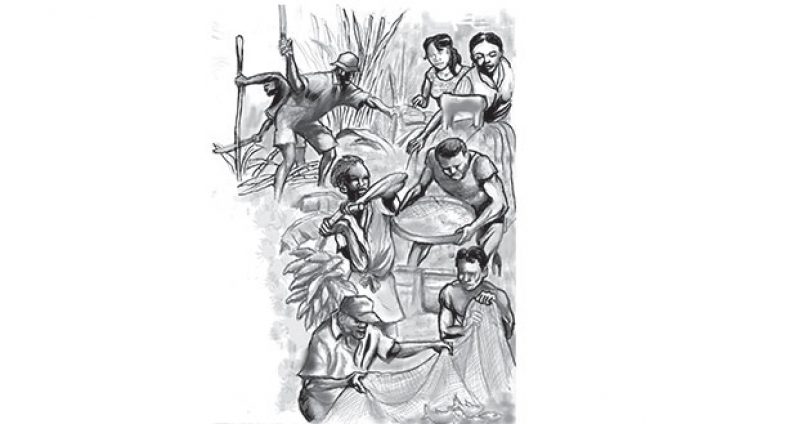WE do not have the tens of millions of souls that enable modern first-world nations to quietly step ahead, leaving entire stubborn populations to be forgotten in the mould of obsolete traditions, and referred to as, Archaeological case studies: Living reflections of past times. The seasons of functional time spaces have been changing faster than ever before in the last 100 years. What was en vogue 20 years ago, has to evolve to exist today, or it will definitely disappear.
If you are reading this article, and are a teacher, retired or else, then you are crucial to this process. I’m suggesting an ‘Adult Education-Restore Project’ to confront the simple fact that we have too many illiterate citizens of a productive age.
EYE-OPENER
Recently, I had an eye-opening, ongoing set of discussions with a village chairman (who also indicated that this was affecting other village chairs) concerning this matter, and he lamented his predicament at how easily rumours become fact, and his inability to dispel them, by way of either the print media or Internet due to this very dilemma. Traditional means of doing business relied on scruples, a virtue that has long been eroded, particularly in the last 20 or so years.
The predominant traditional cultural methods of sustenance referred to entails the following: the journey to ‘bush-bottom’, pork-knockers, timber-grant employment, and fishermen. Services such as ‘cutlass weeder,’ shovel men, canecutters, cash-crop farmers and livestock producers will all be faced with inevitable challenges in the near future.
For the latter, on the horizon lies the cloud of GMO (Genetically Modified Organism) influences, which are sure to creep into our safe haven. Sources have already indicated that this uncertain technology is already here, deciphering for our farmers whether genetically modified crops are beneficial to them and the nation; whether it’s good or dangerous.
MATTER OF TRUST
We already don’t trust much of what appears in our markets; what is sprayed to encourage forced ripening. I can recall discussing with a schoolmate, Veronica Boyce, in the mid-90s about why fishermen at Mahaica were being forced to go farther out to sea to fish.
The fact was that they were fishing throughout breeding periods, wiping out young fish stocks that were later dumped on the foreshore as unsuitable for the market.
She lamented that 90% of the fishermen could not read nor write, and would view any oral information implying change with suspicion and disbelief.
It is not impossible to conceive that procedures to test produce will become a necessity locally, and that large farms with certified organic produce will soon replace the defaulters.
BAINS & BOODOO
I had developed a comic book in the late 90s featuring two farmers, BAINS& BOODOO, for the Pesticides and Toxic Control Board, headed by Basudeo Dwarka. That was initiated after I had written a letter concerning a citizen who had died after eating a papaya. That book instructed farmers on how to use pesticides, etc. I’m not sure of the continued success; Dwarka even wanted to develop animation skits, but that never came through.
A sewing course would not produce a seamstress or tailor without that person being ble to read catalogues and trade books on preferable cloth types, and to understand techniques for requested styles. This also applies to all traditional industries, especially those areas that were guided by passed-down oral practices not documented, that were developed by trial and error, as with the traditional village midwives whose wealth of knowledge, I pray, was recorded some place.
THE VALUE OF READING
The ability to read and record has to be resuscitated; experience learnt need not be ignored, but rather incorporated in the current methodology.
It was not the primitive shovel men with their traditional knowledge of yesteryear that breached the conservancy in 2005, plunging us into death and misery. Nor are they the traditional pork-knockers who’re loyal to their fellow villagers that are now causing so much death in the “gold bush” through their cavalier approach to mining, singularly fuelled by greed.
This is where the crisis lies. I must commend the Police Force on their Career Day recently among the schools, as this is a way to breach the problem that they themselves had.
The major hurdle lies in the villages and townships across our nation, especially in the prisons, where the development of moral logic, based on the transference of positions, responsibility of choice, and the alternative relevance of education can be debated and coerced.
Retired teachers with their faculties intact need not be wasted; subtle methods can be employed towards evolving the workforce engaged in the mentioned traditional economic activities, and to save those adults who, I have learnt, may belong to a second or third generation in that condition, the embarrassment of being taunted for not being able to read and write.
Each time space of our cultural experience should be recorded for the guidance and enlightenment of the coming generation, who need not guess their way.




.png)









